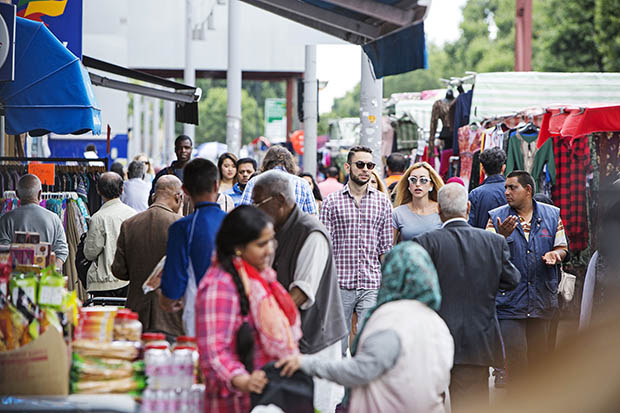Contributing to life in east London together
Ever since Queen Mary’s founding institutions were dedicated to improving local health and education, our university has been a part of east London. Even today, thousands of our staff and students come from and live in the local area.

Universities are often significant 'anchors' within their region. They employ thousands of people, prepare a generation of thinkers, are a place for discovery and learning, and play a critical role in ensuring new knowledge is used to benefit society. They are also part of a broad and complex ecosystem: residents, local government, the NHS, schools and colleges, charities, businesses.
Our east London community – staff, students, residents, businesses, and community organisations – work together to contribute to local life. From school children leading research projects in physics and air pollution; Queen Mary students providing legal advice to residents and organisations; local communities contributing to research from heritage languages to health and wellbeing; or Queen Mary staff providing PPE or free hot meals to those in need during the Covid-19 pandemic.
To celebrate this, Queen Mary is developing a Civic University Agreement that will detail just how the university intends to support the economy, society and place it is a part of in the coming years.
The Agreement in its very nature needs to be developed collaboratively, so we have been gathering views from inside and outside the university over the past few months. Firstly, working with London Citizens, we listened to over 200 residents and representatives of organisations and businesses across east London to understand their priorities and needs.
We also commissioned an assessment of our local economic impact, considering things like our local staff and student numbers, how much we spend locally on goods and services, the businesses, charities and schools we work with, and how we engage with residents. We’ll share more information on this soon.
The Institute of Community Studies is now helping us to make sense of this wealth of information and insight. They took a number of students, staff and community leaders on five 'civic safaris' through the key emerging priorities across east London – including things like providing education, training and work opportunities for local residents; the challenge of meeting the needs of both new and longstanding groups of residents; the untapped potential for new ventures, enterprises, and collaborations; sharing Queen Mary assets, such as our spaces; and Queen Mary’s role as a convenor and facilitator.
This chance to stop and reflect on what we’ve learned so far has been critical, and it has laid the ground for what comes next: prioritisation.
As much as we’d like to, we won’t be able to address all the challenges and opportunities that the listening has identified – at least not from the offset. We must make some decisions about where Queen Mary focuses, based on the needs of both our local area and the university’s diverse community of staff and students.
Those workshops are getting underway now, if you’d like to get involved and shape what comes next. We hope this process will ultimately enable Queen Mary to build a set of meaningful commitments that we can all work towards, supporting our staff and students to continue to contribute to the local area, and help Queen Mary as a whole to play a genuine role in local life.
If you would like to find out more, please get in touch at publicengagement@qmul.ac.uk.